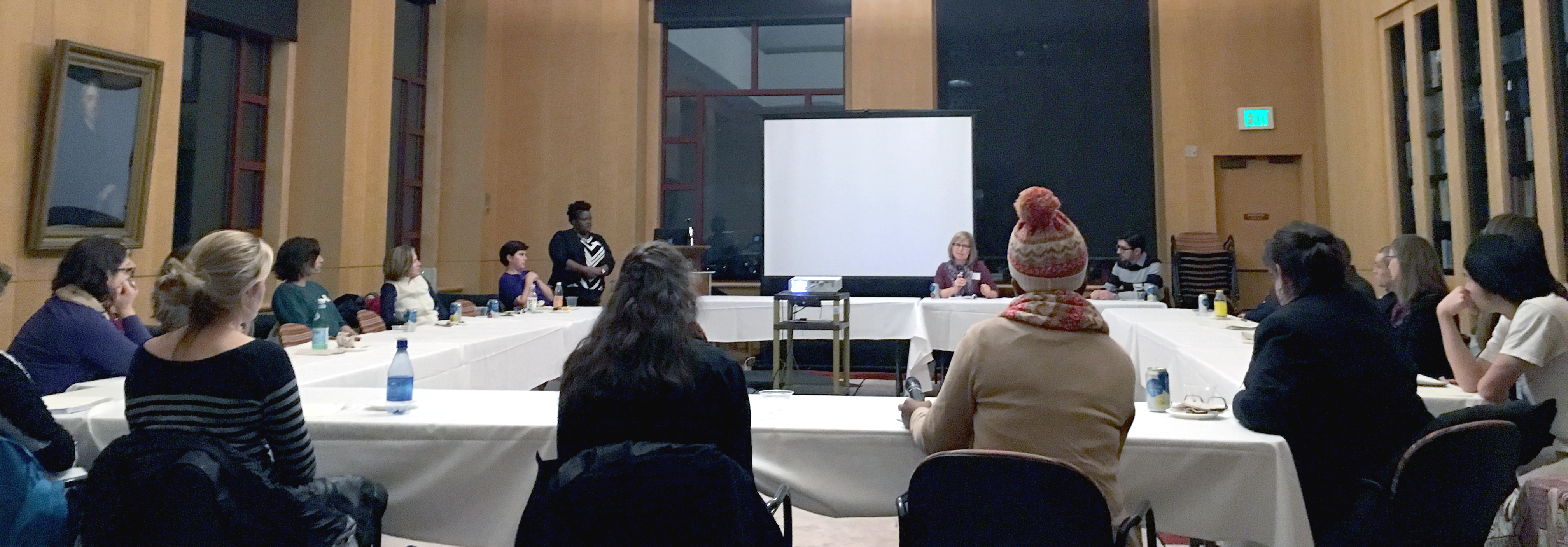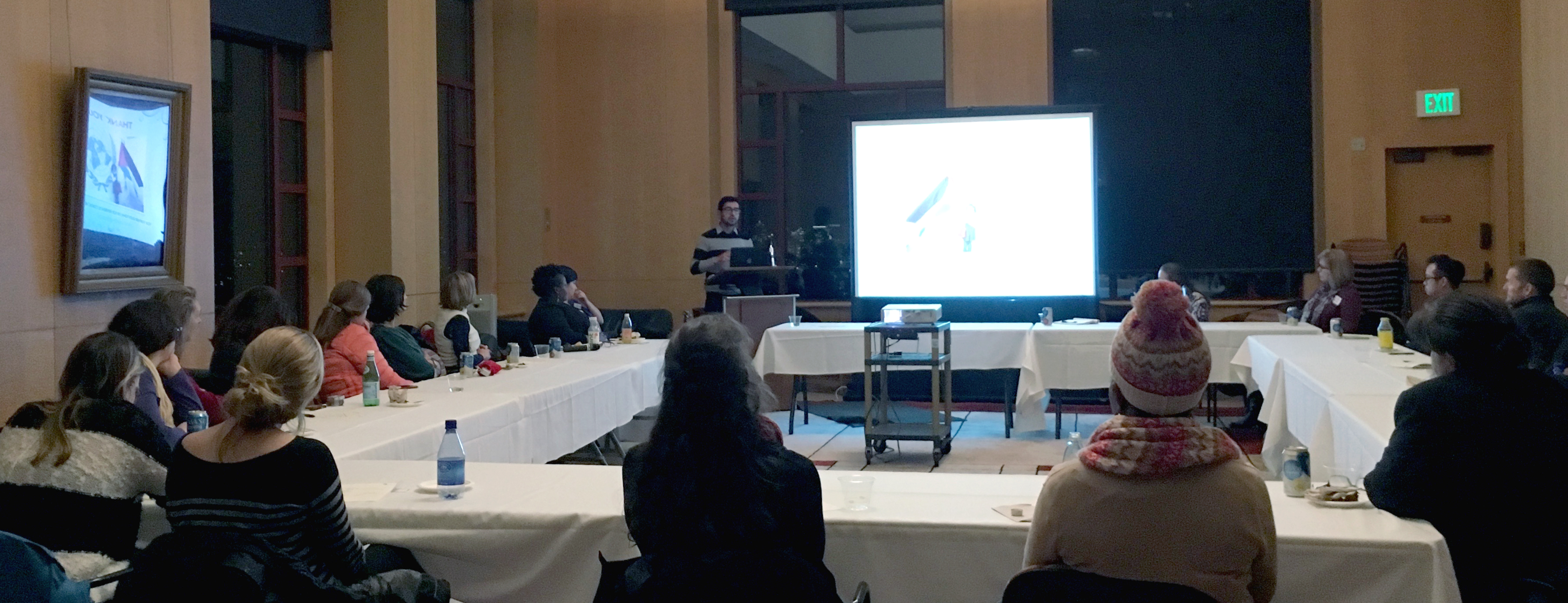The newly formed Global Nursing Forum (GNF) pursues the mission of empowering nurses in the global community in areas of practice, research, leadership, and scholarship. GNF, in collaboration with the UCSF School of Nursing Center for Global Health, supports the global health education and experience of the School’s students who display interest in global health, empowerment of nurses, and work with underserved populations in resource-limited settings. On January 6, the GNF hosted an inaugural event and network celebration entitled “Global is Local.”

The GNF invited four panelists to share their work with the audience of health professionals (students, faculty, and staff from all schools on campus). A packed and energetic Lange Room heard lessons from the classroom to the field, as panelists Carolina Espinosa Noya, PhD(c), FNP-BC, RN, MS; Anne Berit Petersen, PhD, MPH, RN; Irene Ritterman, RN, MS, FNP; and Hamza Alduraidi, RN, MPH, MSN, PhD(c) described their efforts to make a difference in the care of populations in our global community. The event was presented by GNF’s Schola Matovu, RN, MSN, PhD(c) and Linda Gregory, RN, MSN, PhD(c), and moderated by Kimberly Baltzell, RN, PhD, MS and Sally H. Rankin, RN, PhD, FAAN.
Shared Medical Appointment Program Local Community Success
When you consider global it’s not often that you instantly consider the international immigrant population already in the United States. However, that’s exactly who Carolina Espinosa Noya, PhD(c), FNP-BC, RN, MS has been assisting for the last two decades in family practice at Community Health Clinics in Sonoma and the Santa Cruz counties, specifically high-risk diabetes patients. Her novel Shared Medical Appointment (SMA) program has shown dramatic results for these patients who are often uninsured. The concept and practice of SMA offers a two-hour visit to a group of eight-to-twelve patients instead of several twenty-minute visits to individual patients. The SMA format creates a space where clinicians can incorporate diabetes self-management education, medical management and peer support. In the SMA program patients share their individual diabetes care struggles and successes, and support each other. According to Noya, “By putting patients in the driver’s seat, they define the agendas for following work.” She believes the most inspiring aspect of the work is how resilient people are, noting that some have lived through traumatic civil wars and related personal journeys. She takes solace in seeing how people can change when given opportunity and resources.
Women’s Health & Empowerment in Low & Middle-Income Countries
For Anne Berit Petersen, PhD, MPH, RN a presentation by the Nightingales Nurses was the turning point for her life’s work in global nursing. Growing up in Ethiopia, as well as other countries, Petersen has always enjoyed a global perspective. The Nightingales Nurses are nurse activists who work to focus public attention on the behavior of the tobacco industry and its contribution to the preventable epidemic of tobacco-caused disease and death. This group afforded her with the means to return abroad and conduct research. She has worked as a nurse educator in Afghanistan, Ethiopia, Tanzania, and China, and has strong interest in women’s health and empowerment including averting the emerging tobacco epidemic in low and middle-income countries. A collaboration between the UCSF School of Nursing and Hawassa University in Ethiopia during her fellowship provided her with the opportunity to conduct an exploratory study on secondhand smoke and cooking fire smoke exposure among women and children in Aleta Wondo, Ethiopia; the study also examined, how tobacco control can be gender transformative. She gave staggering statistics – such as one hour of cooking fire is equivalent to smoking 400 cigarettes—and offered insights on language, gender, and cultural relations.
Innovative Healthcare Delivery to Marginalized & Isolated Populations
Irene Ritterman, RN, MS, FNP grew up with two sisters and a very open minded father who had two rules for his daughters, each must go away for college and study aboard. Both experiences instilled a global appreciation and fed a curious appetite for learning and cultural experiences. Ritterman’s study abroad took her to France where she studied sex workers in the Bordeaux region with a particular focus on HIV/AIDS prevention. Later, her intervention work spanned to other locations and cultures with an internship where she studied alongside George Rutherford, MD, AM, FAAP, FACPM, FIDSA—Director of the Prevention and Public Health Group, Salvatore Pablo Lucia Professor of Preventive Medicine, Head of the Division of Infectious Disease Epidemiology as well as the Vice Chair of the Department of Epidemiology and Biostatistics in the UCSF School of Medicine. Ritterman spoke about her range of experiences – from policy development redesigning country reports with PEPFAR (U.S. President’s Emergency Plan for AIDS Relief) to administrative leadership as director of operations for Sahara relief group providing health care to desert nomads. She recommended to those seeking a career in global health to not be afraid to reach out to mentors for opportunities, adding the importance of flexibility: chances arise quickly that may shift your original focus. Ritterman advises, “be flexible while staying passionate to your personal mission statement.” Ritterman also echoed other panelists with her emphasis on a need for cultural humility in global health work; that is, the need to understand the interpersonal nature of multi-cultural and diverse teams, which always require a high-degree of collaboration.
Personal Connection to Path for Better Lives for Refugees
The last panelist Hamza Alduraidi, RN, MPH, MSN, PhD(c) is committed to improving the health of refugees. At the root of this pursuit is the personal connection he has with the experiences and challenges of refugees. Alduraidi’s grandparents were among the hundreds of thousands of Palestinians displaced by the 1948 Arab-Israeli War. Many fled over the border into Jordan, including his grandmother and grandfather. His mother eventually would leave the refugee camp at seventeen but shared the stories with her son of problems inherent in overcrowding at the camps including communicable disease, domestic abuse, and mental health issues. Alduraidi has spent the majority of his time and study on trying to determine the best ways to improve the health of refugees. He highlighted that most often, refugees are stalwart in their commitment to the hope of return and that this yearning often has a serious effect on their mental health. Alduraidi realizes how important it is to bring this kind of greater awareness of the plight of refugees to the rest of the world and hopes to lead and inform future policy and research. His recommendation to the event attendees was to always provide the full context for your work to the communities and populations with which you are engaged.
The Global is Local event included a lively question and answer session where panelists engaged the audience on details of their work and experiences. The Center for Global Health at the UCSF School of Nursing shared their programs and offerings. The GNF event provides an opportunity to present the meaningful and innovative research being performed by nurse scientists and to expand this awareness beyond the School enhancing opportunities for inter-professional research collaborations. Linda Gregory, RN, MSN, PhD(c) concluded the event with thanks to those helping support the evening’s program and reminder to solicit applications for those interested in pursing global health work for the GNF’s Ambassador Award, the deadline for which has been extended to February 29.

Related Coverage
- Global Health Minor Aims to Bridge Gap Between Passion and Experience for Nursing Students
- Interview with Carolina Noya, FNP-BC, RN, MS
- Linda Darlene Gregory Believes Diversity Is Transformative
- Hamza Alduraidi: Forging a Path for Better Lives for Refugees
- Uganda: Nurse-to-Nurse Global Initiative
- BRIDGE Project Research Team member Linda Gregory receives Alumni Excellence Award
- Alumni Profile: Five Questions for Kim Baltzell, RN, PhD, NP, MS
